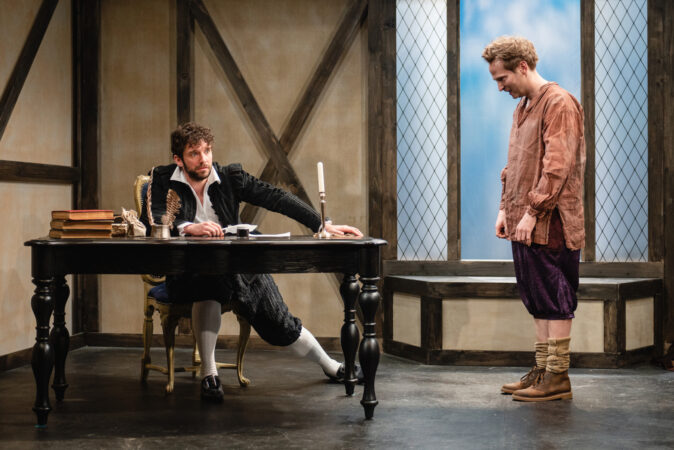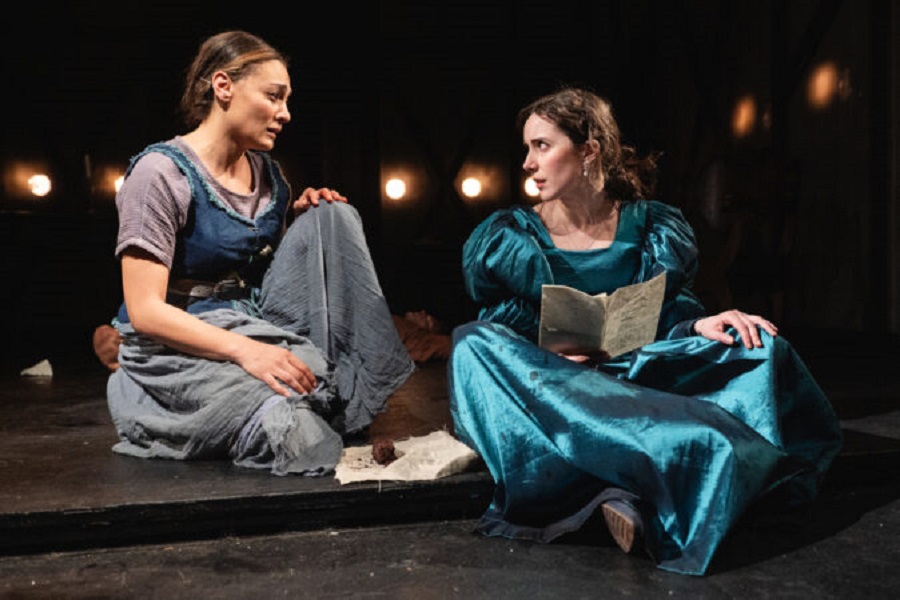Throughout the early months of the pandemic, the message was everywhere. Articles in the Washington Post, The Guardian and The Atlantic explored the subject, and social media overflowed with memes about it: that Shakespeare wrote King Lear during a plague, so how will you use your time?
Talene Monahon gave this prompt her own unique spin. The playwright and actor spent the first months of our current plague writing a comedy about Shakespeare writing a tragedy during the Black Plague. Her two-hander Frankie and Will, starring Michael Urie as Shakespeare and Ryan Spahn as his unpaid apprentice, premiered in May 2020 through MCC Theater’s LiveLab, the digital one-act reading series that featured weekly streams of new works.
Lockdown ended, but Monahon’s work on the script continued. Inspired by the discovery of a female-authored feminist text from the same period, she expanded Frankie and Will into a full-length play, adding two female characters and changing the title to the playbill-busting Jane Anger or the Lamentable Comedie of JANE ANGER, that Cunning Woman, and also of Willy Shakefpeare and his Peasant Companion, Francis, Yes, and Also of Anne Hathaway (also a Woman) Who Tried Very Hard. The new play debuted simultaneously in-person and online in October 2021 through the charity streaming service Play-PerView. It’s back now as an all-in-person production, directed by Jess Chayes and currently onstage at the New Ohio Theater through March 13.
The premise has Shakespeare casting about for ideas to ease his plague-induced writer’s block. The key, he reasons, is a woman name Jane Anger, author of a feminist pamphlet. Not much is known about the real-life author, but Monahan’s discovery of the pamphlet, titled JANE ANGER her Protection for Women and dated 1589, was likewise the key to her play. Published in response to the negative opinions and depictions of women’s character and intellect, it declares its intention “to defend them against the SCANDALOUS REPORTES.” Despite a long history studying Shakespeare and the Elizabethan era, Monahon had never heard of the pamphlet or its author; indeed she could find almost no information about the author—a reflection of the gender biases regarding women at that time and since.
“It was contemporary to Shakespeare, but there’s so little known about it,” she said. “Whereas with Shakespeare, they’ve done so much research. Obviously, there’s a lot that we don’t know, but everything is so thoroughly researched.”
The message of the pamphlet, considered to be the first work of feminist writing published in England, spoke to Monahon. She’s written the character of Jane Anger as a “cunning woman” and former muse of the Bard; she is played by Amelia Workman in the new production. In a practical twist, Monahan added another female character, that of Shakespeare’s wife, Anne Hathaway, to give herself a role in the show and thus reactivate her dormant Actors Equity health insurance, lost over lack of sufficient work weeks during the pandemic.
The many-layered irony of writing a play set during a plague to obtain health insurance in the midst of a pandemic was not lost on Monahon, who described her sense of humor as being that of a 10-year-old boy. Despite the ruffled collars and beaked plague masks in the costume department, Jane Anger is hardly a Renaissance drama. Slapstick humor, wordplay, and plenty of sex jokes pepper the script, inspiring thoughts of Monty Python and Mel Brooks. The writing reflect the relief Monahon felt writing it, as she forged an escape from the fears that filled the early months of the pandemic.
“That was where my mind wanted to live,” she recalled. “I think everything that was happening was so traumatic, and it felt in some ways comforting to write this really crazy comedy.”

Monahon’s play presents a less-than-flattering portrait of Shakespeare, played by Urie as an arrogant egotist, unfaithful to his promises and his wife. This reflects no lack of reverence for the Bard’s plays, Monahan said.
“I feel very thrilled by his work,” she said. “Unfortunately, I don’t know that there is a correlation between being a good person and a great artist. Maybe he was a great person? It’s just fun to imagine that he can be self-absorbed and narcissistic and a little dark There are at this very moment amazing artists who are not good people. It’s an interesting question to reckon with.”
Little is known about Shakespeare’s marriage to Anne Hathaway, but that hasn’t stopped speculation about it, much of it sexist.
“Scholars just have assumed for centuries that there was no love between the two of them, and she trapped him into marrying her, and he couldn’t possibly have been attracted to her because she’s so much older than him and he left her in Stratford,” Monahon said. She noted that Maggie O’Farrell’s book Hamnet, a novel about Shakespeare’s son dying at the age of 11, addresses much of the male-dominated discourse about Anne.
In a nod to recent pop culture, Monahon’s performance as Shakespeare’s wife features some knowing references to the Oscar winning-actress of the same name: Monahan’s Anne is an earnest wife, hard on herself and eager to please her husband and make him happy—a subtle wink at the common criticisms of the actress for coming across as “annoying” and “trying too hard.”
“I think it comes from a lot of our expectations for what we want women to be,” Monahon said. “So it was fun to me to sort of combine the two, with a lot of love to the actress Anne Hathaway, who is amazing, and also to the original Anne Hathaway.”
Not all of Jane Anger‘s timely references have survived its two-year development process—a joke about baking sourdough bread, written in the early months lockdown, has been excised from the script. Indeed, the shape-shifting ephemerality of the art form is something Monahan is feeling now that she’s back onstage.
“I think there’s something incredibly special about being in a room with other human beings, and there’s also kind of the groupthink that happens to an audience, when there’s a new group of people assembled together and they decide together what kind of audience they want to be. It’s really exciting, but it really feels like we are leaning on this ancient practice of theatre. It feels totally perishable.”
There is, as yet, no health insurance for an art form.
Carey Purcell (she/her) writes about pop culture and politics for Vanity Fair, Politico and other publications, and blogs at CareyPurcell.com. She recently published her first book, From Aphra Behn to Fun Home: A Cultural History of Feminist Theater.
Creative credits for production photos: Jane Anger or The Lamentable Comedie of JANE ANGER, that Cunning Woman, and also of Willy Shakefpeare and his Peasant Companion, Francis, Yes and Also of Anne Hathaway (also a Woman) Who Tried Very Hard by Talene Monahan, directed by Jess Chayes, with set design by Joey Mendoza, costume design by Andrea Hood, lighting design by Nic Vincent, original music and sound design by Lindsay Jones, sound-effects design by Matt Frew, fight choreography by Sean Michael Chin, and casting by Claire Yenson


